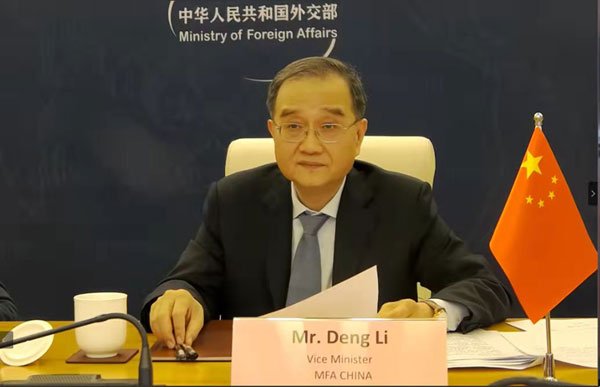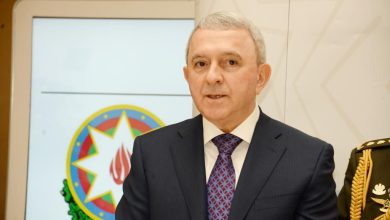
Vice Minister of Foreign Affairs of China
Jordan Daily – On October 7, 2023, the Palestinian group Hamas carried out a surprise attack code-named “Operation Al-Aksa Flood” from Gaza on Israel. In fierce retaliation, Israel launched large-scale air strikes across Gaza and started ground operations since late October.
The ongoing conflict has already claimed over 90,000 casualties on both sides. More than 23,000 Palestinians died and another 59,000 were injured; the Gaza Strip is facing a grave humanitarian crisis. The conflict’s spillover effects continue to manifest themselves, with instability in the West Bank, fires traded between Israel and Hezbollah on the Israel-Lebanon border, Israeli airstrikes on Syria, and Houthi attacks on Israel-linked merchant ships transiting through the Red Sea.
The international community is highly concerned by the escalation of the conflict. The U.N. General Assembly twice adopted resolutions by an overwhelming majority, and the Security Council passed two related resolutions, highlighting the international community’s call for the restoration of peace. It is the general consensus among most countries in the world that a ceasefire should be put in place as soon as possible, civilians should be effectively protected, humanitarian assistance should be delivered and the two-State solution should be implemented.
Since the outbreak of this round of the Palestinian-Israeli conflict, China has been vigorously calling for a ceasefire, working tirelessly for the restoration of peace, and making every effort to save lives. On November 21, 2023, President Xi Jinping attended the BRICS leaders’ extraordinary meeting on the situation in the Middle East. In his important speech entitled “Working Toward a Ceasefire and Realizing Lasting Peace and Sustainable Security,” he stressed that the top priority now is to end hostilities and achieve a ceasefire immediately, ensure secure and unimpeded humanitarian corridors, and act with practical measures to prevent the conflict from spilling over.
He underscored that the only viable way to break the cycle of the Palestinian-Israeli conflict lies in the two-State solution, in the restoration of the legitimate national rights of Palestine, and in the establishment of an independent State of Palestine. President Xi’s remarks received wide international acclaim as they pointed out the root cause of the question of Palestine, represented a just call for an early ceasefire and the restoration of peace, and set the direction for an effective resolution of the Palestinian question.
Time is life. China has not spared a single moment in its diplomatic efforts to help de-escalate the conflict. To build consensus and forge synergy for the restoration of peace, Member of the Political Bureau of the CPC Central Committee and Foreign Minister Wang Yi had in-depth exchanges with leaders and senior officials from over 20 countries and international organizations, hosted the joint delegation of foreign ministers from Arab and Islamic countries, and traveled to New York to chair the U.N. Security Council meeting on the situation in the Middle East, including the Palestinian question.
The Chinese Government’s Special Envoy on the Middle East Issue made several visits to regional countries, and attended relevant international peace conferences, crisscrossing the region to work extensively on all parties. Under China’s rotating presidency of the U.N. Security Council in November, China engaged in intensive communication with all parties to push for the Council’s adoption of a resolution—the first of its kind since the conflict broke out, bringing the hope for peace to the Gazan people amid ongoing fighting.
China also submitted its Position Paper on Resolving the Palestinian-Israeli Conflict to the Security Council, calling for implementing a comprehensive ceasefire, effectively protecting civilians, ensuring humanitarian assistance, enhancing diplomatic mediation, and seeking political settlement, with a purpose to gather greater momentum and nudge more actions at the Security Council. In the meantime, China has provided multiple batches of emergency humanitarian assistance in cash and kind including food and medicine to Gaza through various channels, and will continue to provide more supplies according to the needs of the Gazan people to contribute China’s share to easing the humanitarian situation on the ground.
The international community speaks highly of the just position of China and the role it has played as a responsible major country. They believe that President Xi Jinping’s vision for a community with a shared future for mankind, and the three initiatives he proposed—the Global Development Initiative, the Global Security Initiative, and the Global Civilization Initiative—point the way forward for resolving the question of Palestine. They regard China’s position paper as highly relevant for promoting a ceasefire and cessation of hostilities, and commend China’s important role in pushing for a political settlement of the Palestinian question and upholding peace and stability in the Middle East.
The Palestinian question is at the heart of the Middle East issue, concerning the peace and stability of the region and bearing on international fairness and justice. The latest round of the conflict is a stark reminder to the international community: The question of Palestine is fundamentally a political issue, and the root cause lies in the long delay in realizing Palestine’s dream of an independent state, in the failure to redress the historical injustice suffered by the Palestinian people, and in the absence of effective implementation of the two-State solution and relevant international resolutions. In finding a solution to the Palestinian question, circumventing the “land for peace” principle will not work, piecemeal crisis management will not last, and a comprehensive and just solution is irreplaceable.
China has all along attached great importance to the Palestinian question, closely following the developments in the Middle East, dedicating itself to promoting peace in the region, and actively supporting and taking part in various international endeavors to realize peace in the Middle East. China is among the first countries to support the Palestinian National Liberation Movement and to recognize the Palestinian Liberation Organization (PLO) and the independent State of Palestine. In 1965, the PLO opened its office in Beijing, demonstrating China’s unequivocal support for the Palestinian people’s just cause of restoring their legitimate national rights. Following the PLO’s proclamation of the State of Palestine on November 15, 1988, China issued a statement announcing its recognition of the State of Palestine on November 20.
The Madrid Middle East Peace Conference in 1991 marked the full start of the Middle East Peace Process. China has vigorously supported comprehensive peace in the Middle East, and made its efforts and contribution throughout various stages of the peace process.
Chinese leaders put forward several proposals on the issue with an underlying theme of promoting peace through talks, working toward a comprehensive and lasting peace in the Middle East, and advocating peace talks between Palestine and Israel.
In these proposals, China noted that relevant U.N. resolutions should be observed and the principle of “land for peace” should be implemented; stressed that the legitimate national rights of the Palestinian people should be restored, an independent State of Palestine should be established and at the same time, the security of Israel should be protected, and Palestine and Israel should coexist side by side in peace; and called on the international community to increase input in peace efforts and support the U.N. in playing a greater role.
In 2002, China named its Special Envoy on the Middle East Issue, the first special-envoy mechanism it set up in response to international hotspots. Since then, five Chinese special envoys have visited Palestine, Israel and other relevant countries, working actively to promote peace talks and dedicating tireless efforts to facilitate a settlement. Moreover, China attaches great importance to the role of nongovernmental Palestinian and Israeli advocates of peace. China hosted four Palestine-Israel Peace Symposium meetings in 2006, 2013, 2017 and 2021 respectively, which injected a momentum for peace into the complex and delicate Palestinian-Israeli situation.
Since the 18th National Congress of the Communist Party of China (CPC), guided by Xi Jinping Thought on Socialism with Chinese Characteristics for the New Era and Xi Jinping Thought on Diplomacy in particular, China has pursued major-country diplomacy with Chinese characteristics on the Middle East issue, and worked more proactively for the political settlement of the question of Palestine.
For 11 consecutive years, President Xi Jinping sent congratulatory messages to the special commemorative meeting in observance of the International Day of Solidarity with the Palestinian People. In May 2013, President Xi Jinping put forward a four-point proposal for settling the Palestinian question during talks with President Mahmoud Abbas on his state visit to China.
The proposal underscored the importance to commit to an independent State of Palestine and peaceful coexistence between Palestine and Israel as the right direction, take negotiation as the only path toward peace between Palestine and Israel, firmly uphold principles such as “land for peace,” and the need for the international community to provide important guarantee for advancing the peace process.
In July 2017, in view of the stalemate in the peace process and repeated outbursts of conflict between the two sides, President Xi Jinping put forward another four-point proposal for resolving the Palestinian question, stressing the need to resolutely advance a political settlement based on the two-State solution, uphold the vision of common, comprehensive, cooperative, and sustainable security, further coordinate efforts of the international community to strengthen the concerted efforts for peace, and take a holistic approach and promote peace through development.
In December 2022, President Xi Jinping reiterated at the first China-Arab States Summit that China firmly supports the establishment of an independent State of Palestine, supports Palestine in becoming a full member of the United Nations, and will continue to provide humanitarian assistance to Palestine. He stressed that the international community should stay firm in its commitment to the two-State solution and the principle of “land for peace,” make resolute efforts to promote peace talks, provide more humanitarian and development assistance to Palestine, and strive for a just settlement of the Palestinian question at an early date.
In June 2023, when hosting President Abbas during his visit to China, President Xi Jinping raised three points in light of the latest developments and new changes concerning the Palestinian question. He underlined that the fundamental solution lies in the establishment of an independent State of Palestine that enjoys full sovereignty based on the 1967 borders and with East Jerusalem as its capital; Palestine’s economic and livelihood needs should be met, and the international community needs to step up development assistance and humanitarian aid to Palestine; and that it is important to keep to the right direction of peace talks.
The historical status quo of the holy sites in Jerusalem should be respected, and aggressive and provocative words and actions should be avoided. A more broad-based, authoritative and influential international peace conference should be convened to create conditions for the resumption of peace talks and contribute tangible efforts to help Palestine and Israel coexist in peace. China stands ready to play an active role in helping Palestine achieve internal reconciliation and promoting peace talks.
President Abbas reiterated on many occasions that China is a sincere and trustworthy friend and partner of Palestine. Palestine is genuinely grateful for China’s long-standing strong support and selfless help to the Palestinian people’s just cause of restoring their legitimate national rights, and looks forward to China playing a greater role in promoting Intra-Palestinian reconciliation and realizing peace in the Middle East.
No matter how the regional and international landscapes may evolve, on the question of Palestine, China will always stand on the side of peace, on the side of justice, on the side of international law, on the side of shared aspirations of the majority of countries in the world, and on the side of human conscience.
As a permanent member of the U.N. Security Council and a responsible major country, China will continue to maintain close communication with relevant parties, work for an early ceasefire in Gaza and the easing of the humanitarian crisis on the ground, and work unswervingly for a comprehensive, just and lasting solution to the question of Palestine at an early date and for enduring peace and security in the Middle East.

